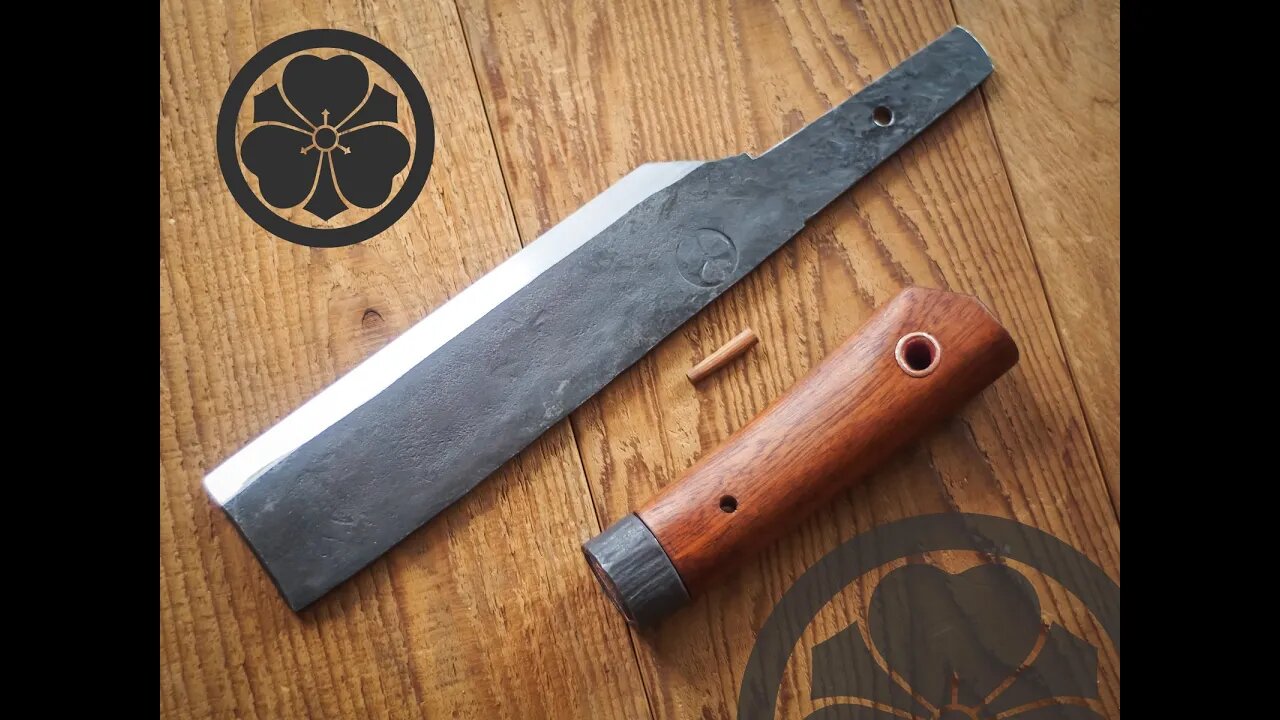Premium Only Content

SOTW #10 - Finishing a Hon-Yaki Nata (Japanese style hatchet)
More info about making a nata: islandblacksmith.ca/2015/06/making-a-hon-yaki-nata/
Most nata are permanently mounted to a hardwood handle because it is faster and easier for production. However, this piece has been assembled using elements of nihonto handle engineering and features swordsmith style hon-yaki edge hardening rather than a thin laminated steel edge. Natural fuki-urushi lacquer brings out the rich colour and grain of the Sapele wood handle and contrasts with the dark forged steel surfaces.
Nata come in various sizes and shapes, but most fit the description of a light brush hatchet or heavy camp knife. Common characteristics include thick spines and heavy blades, often with single beveled edges similar to Japanese wood chisels. This type work well for medium duty camp tasks, carving hatchet work, roughing and shaping, green wood work, and bamboo splitting. Similar to boat builder's or timber framer's slicks, they can make controlled straight slices due to their mass and chisel-like bevel. Another common variation has double sided bevels, cord wrapped integral handles, and curved or hooked blades for working in the rice fields.
This nata has a straight blade and tip, was made from reclaimed lawn mower blade steel (exactly half of an older one, originally stamped "made in USA"), and is mounted in nihonto fusion style. The blade was hand forged in a charcoal fire, shaped with files, differentially hardened using traditional swordsmith style water quench yaki-ire, and polished by hand with water stones. The ura has a slight forged concave to facilitate flat sharpening of the edge.
A forged steel ferrule and copper lanyard eye accent the hand carved Sapele wood handle. A friction fit red Bamboo peg secures the entire assembly together.
Materials: lawn mower blade steel, steel pipe, copper pipe, Sapele wood, Walnut, natural urushi lacquer, red Bamboo
長さ/刃長 Nagasa: 185mm (blade length)
元幅 Motohaba: 47mm (blade depth)
重ね/元重 Motokasane: 5.5mm (spine thickness)
中心/茎 Nakago: 80mm (tang length)
柄長 Tsuka: 134mm (handle length)
-
 LIVE
LIVE
The Quartering
1 hour agoOn To The Big Bosses! Act 2 Of Expedition 33
520 watching -
 1:39:26
1:39:26
Glenn Greenwald
4 hours agoStephen Miller's False Denials About Trump's Campus "Hate Speech" Codes; Sohrab Ahmari on the MAGA Splits Over Antitrust, Foreign Wars, and More | SYSTEM UPDATE #495
73.1K19 -
 8:14
8:14
MattMorseTV
5 hours ago $1.73 earnedTrump just DROPPED the HAMMER.
4.78K7 -
 LIVE
LIVE
Omar Elattar
5 hours agoThe $300M CEO: "The One Skill That Made Me Rich In 15 Different Countries!"
81 watching -
 1:06:12
1:06:12
BonginoReport
4 hours agoEric Swalwell Attempts To Look Manly in Desperate Stunt - Nightly Scroll w/ Hayley Caronia (Ep.101)
103K44 -
 LIVE
LIVE
SpartakusLIVE
2 hours agoTiger Blood RESTOCKED and 30% off w/ code SPARTAKUS30
131 watching -
 30:21
30:21
Friday Beers
4 hours ago $1.78 earnedOur Brutal Golf Challenge: Hot Wings Roulette
30.2K -
 2:58:40
2:58:40
Barry Cunningham
5 hours agoPRESIDENT TRUMP SPEECH AT MAKING HEALTH TECHNOLOGY GREAT AGAIN! EVENT AND MORE NEWS!
55.7K27 -
 3:17:42
3:17:42
ZeeroG
3 hours agoStarfield (E.P 4 ) 7/30/25
4.53K -
 1:00:08
1:00:08
The Officer Tatum
5 hours agoLIVE: Left CANCELS Their Own, All White Town, NYC Shooter Update + MORE | EP 146
30.8K27